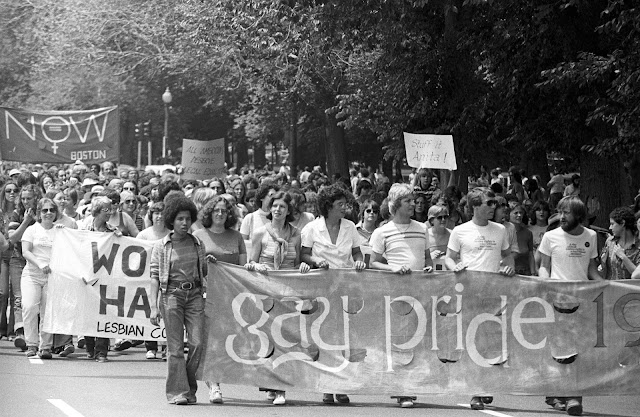Fifty-one years ago today, at 1:20 am, six police officers arrived at the double doors of Stonewall Inn and announced, "Police! We're taking the place!" There had been a rumor that a raid would take place, but it was much later than any raid in the past. There were 205 people in the bar that night, including two undercover police officers already there. The lights were turned on, the music stopped, and the police called for backup.
The raid did not go as planned. Both police and patrons would recall a sense of discomfort setting in very quickly. Within minutes 100 to 150 people had gathered outside, either from being kicked out of the bar by the police or from seeing the commotion and deciding to observe. When the first patrol wagon arrived, the crowd had grown to ten times the size of those being arrested. Before the second would arrive, the situation would explode.
Pennies and beer bottles were thrown at the patrol wagons. One woman being escorted in handcuffs would get in a scuffle with four police officers, fighting them off for ten minutes and inciting the crowd to act up. "Why don't you guys do something?" Marsha P. Johnson, a Black drag queen, sex worker, and activist, is credited with having thrown a shot glass at a mirror at the onset of the fighting. "The shot glass heard round the world."
The police tried to restrain the crowd, leading the crowd to react further. The commotion attracted more people, coming to fight for the cause. The police ended up being outnumbered by some 500 to 600 people, leading ten of the officers to barricade themselves along with several detainees in the Stonewall Inn. The Tactical Patrol Force was sent in to aid the trapped officers, leading to a standoff with the crowd. Night sticks on one side, and I kid you not, a kick line on the other.
The TPF cleared the street by 4:00 am; thirteen people were arrested, several were hospitalized, four police officers were injured. The battle had just started. The next night there would be over a thousand people gathered and protesting, with a similar battle to take place.
And that was just the start. The ensuing riot inspired more riots the following nights as well as civil disobedience and marches across the country. The first Pride parade would take place in New York, exactly one year from the Stonewall Inn rebellion. The parade would cover 51 blocks from Christopher Street, to Central park. Similar events would be organized in Los Angeles, San Francisco, and Chicago. And in the subsequent years, it would continue to spread. "The Stonewall Rebellion was crucial because it sounded the rally for that movement. It became an emblem of gay and lesbian power. By calling on the dramatic tactic of violent protest that was being used by other oppressed groups, the events at the Stonewall implied that homosexuals had as much reason to be disaffected as they."
The bar was raided that night simply because people in the bar loved people of the same sex. Or they dressed like the other sex. Or they refused to be identified by a gender, or recognized that the sex they were born into did not match the sex of their soul.
Homosexuality was a crime. At the time, it would also still be listed as a mental disorder in the Diagnostic and Statistical Manual of the American Psychiatric Association. It would remain there until 1974. Being dressed in drag was a likewise a crime. Patrons of the bar were arrested if they were not found in the "appropriate" attire for their sex.
It's easy to look at all of this as a relic of the past, something we've outgrown. And we have made progress in this respect, but it's important to remember how long it has taken. Anti-sodomy laws were not declared unconstitutional until 2003, in Lawrence v. Texas. This was the case that finally recognized sexual privacy, the ability for two consenting adults to make their own decisions about what happens in the bedroom, without the state's intrusion. LGBTQ+ were not included in hate crimes protection until 2009. "Don't ask, don't tell" was only removed in 2011, allowing LGBTQ+ officers to serve openly. Committed homosexual couples were allowed to have their unions recognized just four years ago, with Obergefell v. Hodges. It took to this year, for discrimination against the LGBTQ+ community to be prohibited.
We have come along way. And in this season of America's history, it's important to remember that this only happened through sweat, through tears, through protest, through violence. Pride has its roots in a violent opposition to the police. In violent opposition to a system that was set up to marginalize a segment of the population.
Sometimes, this is what forces us to acknowledge the issue.
Because there is still a long way to go. To end housing discrimination against the LGBTQ+ population. To restore health care to the transgender community that has been taken away by the current administration.
In the meantime, to any LGBTQ+ readers, stay proud. Keep up the good fight!
